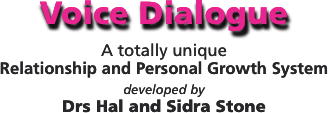Issue 76 –
DISOWNED SELVES: Our Lost Heritage
Part 2
Anger and irritability are also usually disowned fairly early in life. Very few parents can resist the temptation to do away with these “negative” energies in their offspring. Therefore, most of us were taught not to express these feelings directly. People often recall their terrible childhood tempers, but these emotions rarely persist into adult life. It can be quite revealing to track the initial disowning of such selves. When talking to one client’s anger voice we heard the following story of its disowning:
Anger: I had to go underground when she was very young because whenever I came out, her mother got upset and her father withdrew. He’d just walk out of the room if she said anything negative. So she learned to hide me. She learned how to please everyone and make everyone happy, but she never let me out. She never said anything negative or angry or selfish.
A disowned self accumulates energy much as water will slowly accumulate behind a dam-and we have built a different dam for each disowned self. These disowned selves are constantly coming through to us in our dreams. Some of these buried instinctual energies are illustrated by the following dreams:
- Someone is trying to break into my house.
- I’m being chased by wild animals.
- I’m driving my car and Mexican teenagers in the car next to me are leering at me.
- I’m with some bad teenage boys and I’m very perturbed with them. They are trying to molest me sexually. I’m trying to lecture to them. One of the boystouches me on the vagina and I am inflamed sexually.
Each of these dreams symbolizes repressed instinctual energy that is using the dream to make itself known to us. In fact, one of our greatest allies in the evolution of our consciousness is our dream process. By observing our dreams and learning their symbolic language we can recognize both disowned energy patterns and energy patterns with which we are identified. Our disowned selves constantly call out to us in our dreams to come and pay attention to them.
How We Develop
The parts with which we identify usually determine our choice of relationships. For instance, if we are identified with a rational self, that self will want us to relate to rational people. Although our basic tendency is to be repelled by our disowned selves, they do hold a certain fascination for us. The highly indignant sober citizen who wants to do away with pornography yet spends months at a time evaluating pornographic material is a fine example of this type of behavior.
Although attraction to a disowned self perceived in another can often lead to the integration of these energies, unfortunately, we are more likely to see individuals lock into destructive relationships with those who reflect a disowned self. Thus, a woman who negates her sexuality and her physical being will be fascinated by a “he-man” and marry him. She will then do all she can to tame his sexuality and keep him from pursuing his outdoor life. He, in turn, may have been attracted to her timid, nonphysical way of life and intrigued by her sexual inaccessibility. Once married, he, too, is likely to object to these behaviors. Instead of learning from one another, instead of integrating these disowned selves, they live with the reflection of them in their mates, judging them and continually being angered by them.
We can be helpless victims to the multitude of relationships in our lives that reflect our disowned selves, or we can accept the challenge of these relationships and ask: “How is this person, or this situation, my teacher?” Asking this question in itself represents a major shift in consciousness. A great deal of the stress in our lives results from our tendency to attract reflections of our disowned selves in our relationships, and we continue to suffer as the same patterns are repeated in our lives. Unfortunately, for most of us there is no support to learn the lesson inherent in this process. Without this support the energy of our disowned selves grows stronger and more twisted.
When natural instinctual energies such as the need for survival, sexuality, and aggression are disowned over time, they cycle back into the unconscious and go through a significant change. Energy cannot be destroyed; thus, these disowned instincts begin to operate unconsciously and attract additional energy to themselves. They soon lose their natural qualities and become malevolent. At this point we give them a new name -demonic energies. When the energy of a disowned self becomes demonic, natural aggression is often transformed into killing rage, jealousy becomes uncontrollable passion, and natural sexual impulses turn into fearsome experiences. These demonic energies may break through into our daily lives as destructive and vicious behaviors, both on a personal and on a social level.

